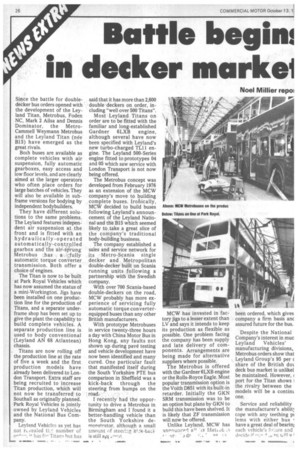Battle begini in decker markei
Page 28

If you've noticed an error in this article please click here to report it so we can fix it.
Since the battle for doubledecker bus orders opened with the development of the Leyland Titan, Metrobus, Foden NC, Mark 2 Ailsa and Dennis Dominator, the MetroCammell Weymann Metrobus and the Leyland Titan (née B15) have emerged as the great rivals.
Both buses are available as complete vehicles with air suspension, fully automatic gearboxes, easy access and low floor levels, and are clearly, aimed at the larger operators who often place orders for large batches of vehicles. They will also be available in subframe versions for bodying by independent bodybuilders.
They have different solutions to the same problems. The Leyland features independent air suspension at the front and is fitted with an hydraulically-operated automatically-controlled gearbox and the air-sprung Metrobus has a ,:fully automatic torque converter transmission. Both offer a choice of engines.
The Titan is now to be built • at Park Royal Vehicles which has now assumed the status of a mini-Workington. Jigs have been installed on one production line for the production of Titans, and a separate underframe shop has been set up to give the plant the capability to • build complete vehicles. A separate production line is used to body conventional (Leyland AN 68 Atlantean) chassis.
Titans are now rolling off the production line at the rate of five a week and the first production models have _already been delivered to London Transport. Extra staff are being recruited to increase Titan production, which will not now be transferred to Southall as originally planned. Park Royal Vehicles is jointly owned by Leyland Vehicles and the National Bus Company.
Leyland Vehicles as yet has not rt.yealed t1.7 number of it has foTitans hut has said that it has more than 2,600 double deckers on order, including "well over 500 Titans".
Most Leyland Titans on order are to be fitted with the familiar and long-established Gardner 6LXB engine, although several have now been specified with Leyland's new turbo-charged TL11 engine. The Leyland 500-Series engine fitted to prototypes 04 and 05 which saw service with London Transport is not now being offered.
The Metrobus concept was developed from February 1976 as an extension of the MCW company's move to building complete buses. Irohically, MCW decided to build buses following Leyland's announcement of the Leyland National and the B15 which seemed likely to take a great slice of the company's traditional body-building business.
The company established a sales and service network for its Metro-Scania single decker and Metropolitan double-decker built on Scania running units following a partnership with the Swedish company.
With over 700 Scania-based double-deckers on the road, MCW probably has more experience of servicing fully automatic torque converterequipped buses than any other British manufacturers.
With prototype Metrobuses in service twenty-three hours a day with China Motor Bus in Hong Kong, any faults not shown up during pave testing and vehicle development have now been identified and many cured. One particular fault that manifested itself during the South Yorkshire PTE bus comparison in Sheffield was a kick-back through the steering from bumps on the road..
I recently had the opportunity to drive a Metrobus in Birmingham and I found it a better-handling vehicle than the South Yorkshire demonstrator, although a small amount of steering ki :k-bacit
is still aor
MCW has invested in factory jigs to a lesser extent than LV and says it intends to keep its production as flexible as possible. One problem facing the company has been supply and late delivery of components. Arrangements are being made for alternative suppliers where possible. The Metrobus is offered with the Gardner 6LXB engine or the Rolls-Royce Eagle. Most popular transmission option is the Voith D851 with its built-in retarder. Initially the GKN SRM transmission was to be an option but plans by GKN to build this have been shelved. It is likely that ZF transmission will now be offered.
Unlike Leyland, MCW has
announcP-1 a" 'Ls Met. :s
dP '
been ordered, which gives company a firm basis anc assured future for the bus.
Despite the National Company's interest in muc Leyland Vehicles' manufacturing divisions„ Metrobus orders show that Leyland Group's 95 per share of the British dot deck bus market is unlikel be maintained. However, port for the Titan shows 1 the rivalry between the models will be a contint one.
Service and reliability the manufacturer's abilit: cope with any teething pi lems with either bus , have a great deal of bearini each vehicle's f,i.ure and dPcide 7ri v, IA
























































































































































































































